The Kingdom of Speech Read online
Page 5
After his return, the Gentlemen inflated Wallace’s reputation for their own purposes—especially Darwin, to assuage his feeling of guilt. Wallace never felt comfortable with any of them except Lyell, who was the old man of the naturalists and had first noticed his talent back in 1855. The others, including Lyell’s wife, Mary Horner Lyell, intimidated him. She found Wallace’s table manners common, bordering on crude. She and the rest of the Linnean crowd struck him as terribly class-conscious. They were the real thing. They had upper-class drawls—far became fahh, extraordinary (six syllables and thirteen letters) became ex-strawwwd-nry (thirteen letters and three syllables). They excelled at the sort of ironically clever conversation they had picked up and polished at Oxbridge. Even their blandest comments piped out UPPER CLASS! UPPER CLASS! without bringing up the subject of class at all. You could have a conversation with these people and not realize until two weeks later that they had slipped the finest ivory needles between your ribs and insulted you to the core.
Wallace was rendered quiet to the point of vanishing when he was around them…whereas previously, among others, such as the eccentric Englishman James Brooke, who was the rajah—the actual rajah—of Sarawak, in Borneo, no one had ever been more confident or adept at entertaining a whole roomful of people than Wallace. “The Rajah was pleased to have so clever a man with him,” said the rajah’s secretary, “and if he could not convince us that our ugly neighbors, the orangutans, were our ancestors, he pleased, delighted and instructed us by his clever and inexhaustible flows of talk—really good talk.”46
Darwin displayed many symptoms of guilt over nipping Wallace’s underwear the way he had. Whenever the discussion, in print or in person, got around to “Mr. Darwin’s Theory of Evolution,” Darwin always made a point of mentioning that Mr. Wallace had also done important work in this area, so important, in fact, that in 1858 their original papers on the subject had been presented jointly before the Linnean Society. All these references came across as the great master pat pat patting his little protégé on his little head head head again.
Yes, over and over, until the day he died, Darwin sent up flares signaling his guilt. There is a difference, however, between guilt and regret. Of regret the man never betrayed one twitch. Either way, Wallace’s reflected light grew brighter and brighter. The accumulation of Darwin’s praise (only Lyell and Hooker knew it was guilt-driven) lent Wallace a certain heft, nonetheless…and his constant deferring to Darwin as the discoverer of natural selection kept him in the good graces of the Gentlemen.
So Wallace became a celebrity lit up by indirect light. By now that didn’t seem to trouble him in the slightest…for it was a lovely light. From there on out, nothing he wrote could be ignored. And write he did. He had a wonderfully clear, direct style and seemingly endless energy and originality. He went on to turn out an astonishing seven hundred articles and twenty-two books…he popularized the theory of natural selection—in fact, he wrote a book entitled Darwinism—but also branched out into anthropology, geography, geology, and public policy…and he never left Britain to go flycatching again. He was on his way to international renown and enough gold medals from learned societies and Queen Victoria to make his white tie and tails blaze with a chestful of honors.
By 1870 Wallace’s heft had turned into real gravitas—to Darwin’s sudden dismay. Darwin had screwed up his courage and begun working on The Descent of Man, his sequel to The Origin of Species, formally pronouncing man a descendant of the apes and monkeys and a product of natural selection, when Wallace published “The Limits of Natural Selection as Applied to Man,” the end piece of a collection of his articles entitled Contributions to the Theory of Natural Selection.
On the thirty-ninth page of this forty-page essay, he gets off a line that lives on in the annals of annihilation by anesthesia. There is nothing in the pages you have just read, says Wallace, that “in any degree affects the truth or the generality of Mr. Darwin’s great discovery.”47 No, nothing except for the fact that in the preceding thirty-eight pages he has systematically disassembled and demolished what was dearest to Darwin’s heart, the central point of his entire theory from the beginning, namely, that human beings are animals themselves, merely the most highly evolved species of animal, to which Wallace replies, in effect: I’m sorry, but there is a cardinal distinction between man and animal.
Once he gets started, Wallace wastes no time moving in for the kill. He goes straight after three of Darwinism’s central assumptions. One, natural selection can expand a creature’s powers only to the point where it has an advantage over the competition in the struggle for existence—and no further. Two, natural selection can’t produce any changes that are bad for the creature. And three, natural selection can’t produce any “specially developed organ” that is useless to a creature…or of so little use that it is not until thousands and thousands of years down the line that the creature can take advantage of the organ’s full power.
The creature is man, and the “specially developed organ” is the brain. Wallace goes to some pains to demonstrate that among mammals the size of the brain has an “intimate connection” to intelligence. For example, “whenever an adult male European has a skull less than nineteen inches in circumference or has less than sixty-five cubic inches of brain, he is invariably idiotic.”48 The Neanderthals and all other prehistoric human beings dating back to the Stone Age had brains bigger than that and nearly as big as modern man’s, as do the most untutored peoples of the present…while the brains of the most intelligent apes, such as chimpanzees, gorillas, and orangutans, are scarcely one-third the size of man’s. That means, says Wallace, that prehistoric man had a “specially developed organ” with far more power than he needed to survive…and it was literally ages before modern man began to make full use of it. So here he is, equipped with “an organ that seems prepared in advance, only to be fully utilized as he progresses in civilization.”49
In no way, said Wallace, can natural selection account for such a thing. But neither can natural selection account for man’s hairless body, especially his bare back, which makes him highly vulnerable to wind, cold, and rain. All other primates, even in Africa and the tropics, grow hides or coats of hair that protect them to the point of making them waterproof. The hair of the coats is layered at a downward angle. Rain rolls right off. Does man miss that? All the time, said Wallace. In fact, since time immemorial, men have been using animal hides and anything else they could think of to keep their backs covered.50 There you had it—an obvious case of what Darwin said couldn’t happen: injurious evolution. “A single case of this kind,” Darwin himself had said, tempting Fate, “would be fatal to [the] theory.”51
But there was fatal…and there was smashed to death, to use Darwin’s own word. Smashed to death came in the form of the highest achievement of the human brain: abstract thought. Without that, said Wallace, no man could have conceived of numbers, arithmetic, and geometric forms…he would never have experienced pleasure in music and art…he would have no conscience and therefore no moral codes…he would have no “ideal conceptions of space and time, of eternity and infinity”52…no sense of the past or the future…no consciousness of man’s place in the world…no capacity for recording the here and now so that he could draw upon accurate memories in making plans for the long term or even five minutes ahead. None of these, mankind’s highest and most refined abilities, had anything to do with natural selection. Natural selection could only make a species fit enough to survive, physically, in the struggle for life. Survival? Absolute domination is the name for it in man’s case. Man’s brain “has led to his conquest of the world”…as Wallace put it nineteen years later in his book Darwinism. The power of the human brain was so far beyond the boundaries of natural selection that the term became meaningless in explaining the origins of man.
No, said Wallace, “the agency of some other power” was required. He calls it “a superior intelligence,” “a controlling intelligence.” Only such a power, “a new
power of definite character,” can account for “ever-advancing” man.53 Whatever that power is, it is infinitely more important than mere natural selection.
Now, that hurt. Once again, this little flycatcher Wallace had (to use an anachronism, as noted above) freaked out Charles Darwin. In a regular frenzy Charlie began scrawling NO!— NO!— NO!— NO! in the margins of his copy and then hurling spears in the form of exclamation points.54 Only a few wound up immediately following the NOs. The rest of them hit the page in the form of…take that, Wallace!…right through your temporal fossa and your little fifty-cubic-inch brain cavity!…and this one!—riiiippp—right through your solar plexus!…and this one!…right through your bowels!…and this one!…a regular crotch crusher!…and this one…straight through your ungrateful heart!!!!!! And to think that I went to the trouble of building up your reputation. True, it was out of guilt, but I built it up for you all the same. And don’t think that pathetic little disclaimer on page 39 absolves you of any treachery, either.
Finally he pulled himself together and sent Wallace a note saying, “I hope you have not murdered too completely your own and my child.”55
Oh, but he had. Murdered or, less dramatically, tried to destroy what Wallace had done with the entire Olympian climax of Darwin’s Theory of Evolution. Darwin was in no mood to be less dramatic, however. Wallace’s treachery, coming on top of Max Müller’s summary dismissal, did qualify as murder, when you got right down to it.
His only relief came when Wallace, bafflingly, began self-destructing as a scientist by becoming a believer in spiritism, which had become something of a vogue among many otherwise intelligent people. Spiritism did not necessarily involve a belief in God. But you did have to assume there was some kind of fourth dimension, the unearthly domain of a force, a spirit, that ordinary mortals couldn’t comprehend. This was what Wallace, a confirmed atheist since his early teens, had in mind when he began to go on about “the agency of some other power”…“a new power of a definite character”…“a superior intelligence”…“a controlling intelligence.” One way to commune with the Power was to engage in séances, complete with table rapping, tarot cards, and inexplicable moans and cries. One goal, among several, was to get in touch with dead souls on the Other Side of the river. Wallace managed to get Darwin to attend one. He lasted less than fifteen minutes before walking out, shaking his head.56
In fact, Wallace was attributing to supernatural powers something as natural as breathing to human beings everywhere—and only to human beings—namely, speech, language, the Word.
Language in all its forms advanced man far beyond the boundaries of natural selection, allowing him to think abstractly and plan ahead (no animal was capable of it); measure things and record measurements for later (no animal was capable of it); comprehend space and time, God, freedom, and immortality; and remove items from Nature to create artifacts, whether axes or algebra. No animal could even begin to do any such thing. Darwin’s doctrine of natural selection couldn’t deal with artifacts, which were by definition unnatural, or with the mother of all artifacts, which was the Word. The inexplicable power of the Word—speech, language—was driving him crazy and Wallace across to the Other Side.
But a cosmogonist like Darwin couldn’t let it go at that. Speech had to have some animal genealogy…had to fit into his Theory of Everything. It was on his mind constantly. It was a threat he couldn’t dodge much longer.
a See the Darwin Correspondence Project database for the letter sent by Hooker and Lyell to J. J. Bennett, Esq., the secretary of the Linnean Society. On June 30, 1858, they wrote to request that Darwin’s and Wallace’s papers be presented at the following day’s meeting (www.darwinproject.ac.uk/entry-2299).
b Taken from a letter Darwin wrote to Lyell on June 25, 1858. For the complete letter, see the Darwin Correspondence Project database (www.darwinproject.ac.uk/entry-2294).
c Darwin sent Hooker copies of the letter to Asa Gray, an 1844 sketch of his theory (which Hooker had previously annotated), and Wallace’s paper. These items were accompanied by one of two letters sent on June 29, 1858, in response to Hooker’s request. In both June 29 letters, Darwin alludes to the fact that Hooker and Lyell will be drafting a manuscript for submission to the Linnean Society. For the complete text of these letters, see the Darwin Correspondence Project database (www.darwinproject.ac.uk/entry-2297 and www.darwinproject.ac.uk/entry-2298).
d Darwin thanks Frances Hooker in a letter to her husband dated July 5, 1858 (available at the Darwin Correspondence Project database, www.darwinproject.ac.uk/entry-2303), and again on July 13, 1858 (www.darwinproject.ac.uk/entry-2306).
e From the letter of July 5, 1858.
f The papers were introduced by a reading of the June 30, 1858, letter from Lyell and Hooker to the secretary of the Linnean Society. See also Charles Darwin and Alfred R. Wallace, “Proceedings of the Meeting of the Linnean Society held on July 1st, 1858,” Journal of the Proceedings of the Linnean Society: Zoology 3.
g The original letters are lost, but Wallace’s response to Hooker (dated October 6, 1858) provides some information on their contents. (See the Darwin Correspondence Project database, www.darwinproject.ac.uk/entry-2337.)
h Darwin’s health problems have been the subject of much speculation. He discussed his symptoms and treatment in his personal correspondence, and Emma Darwin kept notes on his health and sleeping habits in her diary. Biographer Janet Browne takes a more contemporary approach in Darwin’s Origin of Species (New York: Atlantic Monthly Press, 2007).
i Huxley published a second anonymous review in the Westminster Review (April 1860). He also published credited reviews in Macmillan’s Magazine (April 1860), The Medical Circular (March 7, 1860), and the Proceedings of the Royal Institution of Great Britain (February 10, 1860).
j Coleridge first used the term in On the Constitution of the Church and State According to the Idea of Each (1830).
k Darwin kept detailed notes on the schedule and printing record of The Origin of Species in his diary.
l As early as 1838 Darwin had written in his notebooks and letters about the conundrum of language. Darwin’s “Old and Useless Notes About the Moral Sense and Some Metaphysical Points” was transcribed and edited by Paul Barrett and published alongside a facsimile of Darwin’s original manuscript in Darwin Online. After the publication of The Origin of Species, other scholars applied his Theory of Evolution to all aspects of human existence.
m Wallace says as much in a letter to Darwin dated May 29, 1864.
Chapter III
The Dark Ages
It was bad enough that Max Müller had challenged him directly, flat-out, out loud, in public, before the Royal Institution—and made fun of him—over this accursèd business of language.57 That was eight years ago, 1861, and all this time Darwin had been trying to find something, anything, in the sounds, gestures, habits, and facial expressions of animals that he could claim as evidence of language evolving. It had to be there somewhere! But if so, not he, not Lyell, Hooker, Huxley, nor any other of the faithful could find it. And then comes the turncoat Wallace piling on with a whole slew of other powers that seemed to have come to Homo sapiens from out of the blue, leaving Darwin and his entire theory and all his devotees stuck on the wrong side of the Rubicon.
At first he had been angry. But now he had a headache. What a mess. How could he explain his way out of it? He could give in and concede that, well, yes, he hadn’t been right about everything, such as this business of language…that way out lasted about one blink. He was too far gone in his cosmogonist obsession. After all, his Theory of Evolution was a theory of…everything.
In a desultory fashion he had begun writing a sequel to The Origin of Species. He thought of it as his “Man Book” because it would bring the formerly missing Homo sapiens into the big picture of Evolution.a Wallace had already beaten him to the punch on natural selection, and it had taken every bit of Darwin’s influence and slick-slick-slickness as a Gentleman to euchre the nai
ve flycatcher out of his priority. But suppose the flycatcher were to come out with a book murdering “your own and my child” and showing that Evolution couldn’t possibly account for the tyke’s gift of abstract thought? What if he put across the idea that some “new power of a definite character,” some “controlling intelligence”—some force ordinary mortals couldn’t comprehend—set man apart from animals?58
As far as Darwin was concerned, the slate on Wallace’s roof had come loose…thanks to all this spiritism rubbish. He didn’t try to discredit Wallace on those grounds, however. Up to now Darwin’s and the Gentlemen’s class superiority had intimidated the flycatcher. But if Wallace got good and riled up, he just might open up the matter of priority again and expose the fast one the trio of Gentlemen—Lyell, Hooker, and Darwin—had put over on him when he was 7,200 miles away in Malaysia and oblivious of what they were up to…besides, any disparagement of this “controlling intelligence” Wallace kept talking about might be interpreted as an attack on the Almighty, and Darwin was already in enough trouble on that score. He had to come up with a more subtle rebuttal to Müller and Wallace. And speed was of the essence. Who knew how far or how fast Wallace might try to go with this stuff?
By then, 1869, Darwin was sixty years old and more of a hopeless dyspeptic, or hypochondriac, than ever. Vomiting three or four times a day had become the usual. His eyes watered and dripped on his old gray philosopher’s beard. The chances of his leaving his desk in Down House and going out into the world looking for evidence, as he had on the Beagle, were zero. Instead he chained himself to his desk and forced himself to write, as he had in 1858 and 1859, when he forestalled Wallace with The Origin of Species. Now he faced the worst threat ever to his Theory of Everything. So he wound his imagination up to the maximum and herded all the animals together in his head, like some Noah the Naturalist, and inspected them—hyperinspected them this time—until he found what he was looking for, namely, embryos of all the Higher Things…language, the moral sense, abstract thought, art, music, religion, self-consciousness…whatever the human mind was capable of, he found early origins of it in animals.59 The upshot was a real tour de force of literary imagination entitled The Descent of Man, and Selection in Relation to Sex, published in 1871.

 Back to Blood
Back to Blood The Painted Word
The Painted Word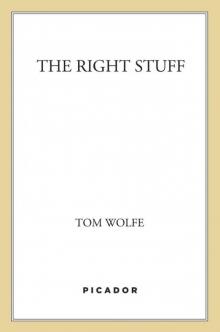 The Right Stuff
The Right Stuff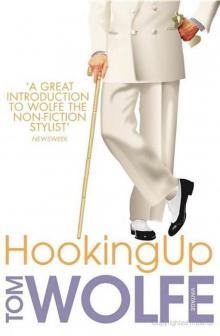 Hooking Up
Hooking Up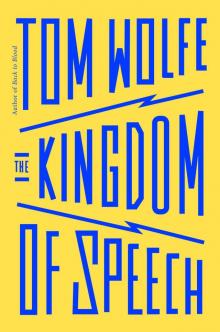 The Kingdom of Speech
The Kingdom of Speech The Bonfire of the Vanities
The Bonfire of the Vanities The Electric Kool-Aid Acid Test
The Electric Kool-Aid Acid Test The Kandy-Kolored Tangerine-Flake Streamline Baby
The Kandy-Kolored Tangerine-Flake Streamline Baby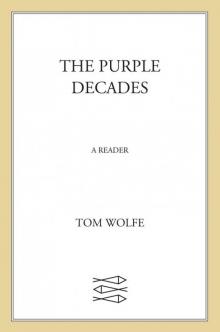 The Purple Decades - a Reader
The Purple Decades - a Reader Back to Blood: A Novel
Back to Blood: A Novel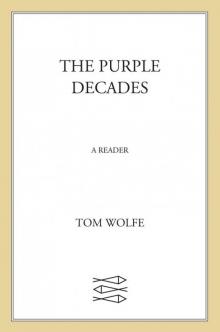 The Purple Decades
The Purple Decades